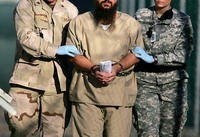Uzbekistan should punish torture of detainees by security and other officials
Uzbekistan should not endure the torture of detainees by security and other officials.

The Committee Against Torture, made up of 10 independent rights experts, said it had received "numerous, ongoing and consistent allegations concerning routine use of torture" by Uzbek authorities.
It said credible reports indicated such abuses often occurred before suspects were formally charged and while they were being held in pretrial detention.
The situation in the Central Asian ex-Soviet republic is made worse by the reported use of secret regulations that allow authorities to use methods prohibited by Uzbekistan 's laws, the committee said.
"The state party should apply a zero tolerance approach to the continuing problem of torture," the report said.
In a 90-page report issued before the committee met, Human Rights Watch said Uzbekistan should be condemned for flagrantly violating a global torture ban.
The New York-based organization accused the Uzbek government of using a wide range of torture methods on detainees, from beatings with truncheons and water bottles to asphyxiation with plastic bags and gas masks, electric shocks and sexual humiliation.
The U.N. panel brushed aside as immaterial Uzbekistan 's listing of crimes that allegedly had been committed by people before they reportedly were tortured by authorities.
"The committee notes with concern that the state party often presents extensive detail on the alleged crimes committed by individuals rather than providing information on the results of investigations into the allegations of torture," it said.
The panel, which meets to review countries' adherence to the 1984 Convention Against Torture, said Uzbek authorities must note that the treaty is an absolute ban.
"No exceptional circumstances whatsoever, whether a state of war or a threat of war, internal political instability or any other public emergency may be invoked as a justification for torture," the committee said at the end of its autumn session.
It said it was also concerned over many allegations that Uzbek military and security forces used excessive force in putting down the May 2005 uprising in the eastern city of Andijan. Survivors and human rights groups said at least 700 died, but the government put the figure at 187 and blamed Islamic militants for instigating the violence.
It also criticized Uzbekistan for cracking down on human rights organizations and failing to allow independent organizations to have acceptable conditions for meeting privately with prisoners to determine how they are treated.
"The committee has also received credible reports that some persons who sought refuge abroad and were returned to the country have been kept in detention in unknown places and possibly subjected to breaches of the convention," it said.
Uzbekistan said it fully adheres to international standards of interrogation and opposes torture.
Amnesty International has accused Uzbekistan of arbitrarily arresting numerous rights activists, journalists and demonstrators since 2002, often forcing them into signing confessions through ill-treatment or by threatening relatives with harm. It also cited reports of detainees apparently tortured to death.
The bodies of two Uzbek men who recently died in prison after being convicted of Islamic extremism showed signs of severe torture, relatives and a rights activist in the Uzbek capital Tashkent said Thursday.
Human rights advocate Surat Ikramov said torture of people imprisoned for alleged Islamic extremism has increased before next month's presidential election. Thousands of devout Muslims in Uzbekistan have been targeted by authorities fearful of the growing threat of Islamic fundamentalism in Central Asia .
President Islam Karimov's government has ruled the state of 27 million people with an iron fist since before the 1991 Soviet collapse - first as the Communist Party boss and then as president, tolerating no dissent and eliminating opposition.
Subscribe to Pravda.Ru Telegram channel, Facebook, RSS!





